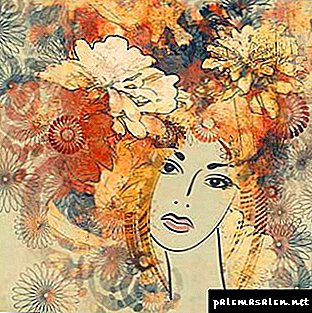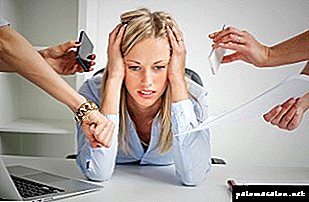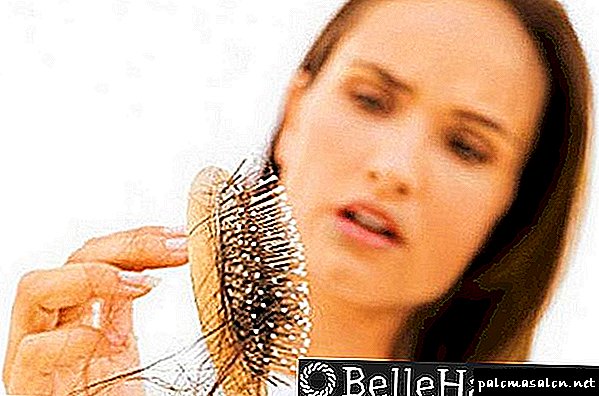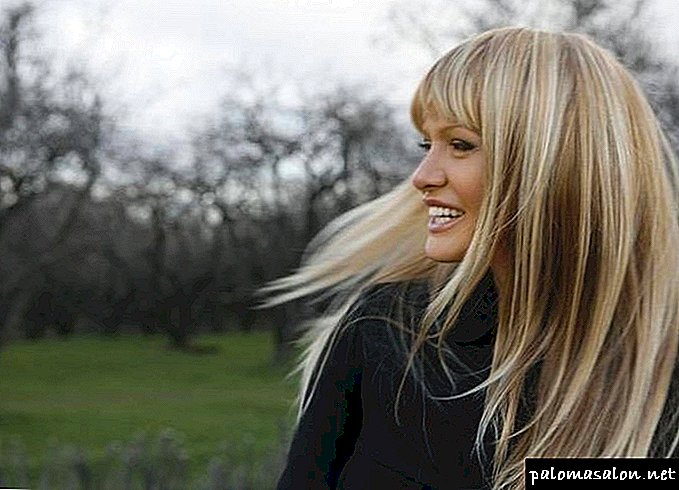 As for the psychosomatics of hair loss, most often the spiritual reasons for this phenomenon may be a lack of human connection with God, the lack of spirituality. Our Sahasrara chakra (in the crown of the head) is responsible for communication with God. If the chakra is covered due to lack of spirituality, then this directly affects the hair, the hair falls out. When the connection with the Higher is restored, the normal functioning of the hair is restored. Another spiritual cause of this scourge may be problems in the relationship with the mother.
As for the psychosomatics of hair loss, most often the spiritual reasons for this phenomenon may be a lack of human connection with God, the lack of spirituality. Our Sahasrara chakra (in the crown of the head) is responsible for communication with God. If the chakra is covered due to lack of spirituality, then this directly affects the hair, the hair falls out. When the connection with the Higher is restored, the normal functioning of the hair is restored. Another spiritual cause of this scourge may be problems in the relationship with the mother.
The psychosomatic causes of hair loss may be:
At the soul level, hair loss entails a violation of a person’s sense of security, communication problems and an uncomfortable feeling of being in the world.
You have been or are in a relationship with someone who does not allow you to make mistakes. This led to the fact that you are too strict with yourself, even, perhaps, punishing yourself (consciously or unconsciously) when you did not manage to act in such a way that other people like it.
You may have a rejection trauma. Authoritative, significant figures for you, may have rejected you now or in some way was affected by the rejection injury received in childhood.
You do not feel your importance and need to people and society. You doubt your ability to fit into the environment or the team, all the while waiting for rejection. All you aspire to is to feel safe, protected from the cruel world.
You seek to control everything, but you cannot satisfy this need, as you are overwhelmed by a more authoritative person. You are often stressed and worried too much. Often you spend all your energy on anxiety, not on resolving issues. You have a fear of failure. Worry about failure holds down many of your actions and manifestations in life.
The mechanism of psychosomatic hair loss
Psychosomatics is a separate medical area in which special attention is paid to the relationship between the occurrence of diseases and the state of the human psyche. From the point of view of psychosomatics, psychological problems, chronic stress, anxiety and experiences can directly affect the course of somatic (bodily) diseases, including hair loss. Why is this happening?
- The nervous system provides interrelated activities of all regulatory systems, endocrine, metabolism, respiratory, cardiovascular.
- Both the internal and external environment affects the nervous system.
- Under the influence of psychologically difficult situations in the body, hormone secretion changes.
- Stress hormones are adrenaline and norepinephrine, with the release of which the muscles of the hair follicles greatly contract, squeeze and pinch the hair.
- Another stress hormone is cortisol, which is also produced on the background of strong physical and mental overstrain.
- A trace response with an increase in cortisol is an increase in testosterone and its metabolite dihydrotestosterone, which is the androgenic cause of hair loss.
- In women, at the moments of experiences and strong emotional shocks, the secretion of prolactin may increase, which will also upset the hormonal balance.
- Changes in the ratio of female sex hormones and a decrease in estrogen is manifested by the loss of beautiful hair.
Psychosomatics: what is it
The common perception that the cause of any disease is nerves is not so far from the truth. Psychosomatics studies the relationship of psychological problems with physical health. According to modern studies, 75% of diseases that occur in humans are psychosomatic and arise as a result of anxiety and nerves. It is not difficult to explain this: substances produced by the nervous system are in direct contact with the immune system, affecting its state. Mental illness directly destroys the body’s defenses, causing numerous physical ailments.
Hair loss or alopecia is one of the primary signs of mental disorder. The reason for this scourge may be conflicts in the family or at work, fatigue, stress, and any other negative emotions. The consequences, along with the appearance of dandruff and seborrhea, can be more intense hair loss and even whole strands. Due to the greater emotionality, this threat is more often exposed to the weaker than the stronger sex: according to statistics, every third woman has problem hair.

Hair loss is one of the primary signs of mental disorder
Why does hair fall out due to stress?
Psychosomatic disorders can manifest for one of three reasons:
- Bad genes that, supplemented by psychological causes, aggravate the condition of the hair,
- Directly external stresses: significant events, entailing a strong shock,
- Constant internal dialogue that can be triggered by guilt feelings, conflicts with oneself, complexes, old offenses and others. This is possible, for example, in the fear of rejection that haunts a person in society. The eternal fear of “doing something wrong”, the inability to take matters into their own hands leads to the fact that most of the energy is spent on anxiety, and not on resolving existing problems. Accumulated fear can also be a consequence of incomplete sexuality and inharmonious situation in the family.
There are two conditions of the nervous system that can provoke such consequences:
- Chronic stress. If an unstable emotional state accompanies you for a long period, it leads to malfunctioning of all body systems. As a result, the hair does not receive the right amount of blood and oxygen, which leads to a weakening. With prolonged and clinical depression, complete cessation of hair growth is possible, since hair follicles that do not receive the necessary nutrients die over time. Restore the old look of hair does not succeed.
- Sudden shocks. To say about the hair, that they stood on end - not such an exaggeration, it really happens with a sharp nervous surge. At the same time, muscle contraction, due to which the hair is kept on the head, leads to their instability. Touching the hands or a comb to the head at such a moment may result in loss of curls. In the absence of a relapse after such a shock, the hair will fully recover after 3-4 months.

Chronic stress is one of the causes of hair loss.
In addition, with nervous anxiety, this state also takes over the body, which is in relentless tension. Due to the unnatural position of the back, neck and limbs, blood circulation and metabolic processes are disturbed. A similar situation may occur with a "sedentary" lifestyle.
Interesting: Mental illness of trichotillomania is characterized by involuntary pulling of one's own hair from the head. Such a habit can entail both external causes (lack of iron and copper in the body, cranial injuries), and internal. The disease is often triggered by prolonged depression, increased anxiety, or even schizophrenia. Trichotillomania requires indispensable treatment from a specialist.
How to determine that the cause of the disease - neurosis?
In order to contact a specialist, you need to know the cause of the disease. Of course, only an examination and diagnosis can give an accurate answer, but a number of symptoms still can give you a hint. You can confidently suspect psychosomatics if:
- Hair falls out gradually over a long period, but every day their number gradually increases. If alopecia has other non-psychological causes — for example, age, illness, or a genetic predisposition — it occurs abruptly, the hair becomes thin in a short period of time.
- In addition to hair loss, the quality of the hair is changing for the worse. The head has to be washed more often than usual, since the sebum is secreted in large quantities (normally, the hair should look clean for two to three days). The appearance of curls also leaves much to be desired: the color fades, volume is lost. This is due to hormonal disruption, which inevitably entails prolonged depression.
- The condition has worsened not only hair, but also skin throughout the body, as well as nails. It is these three areas that primarily affect progressive neurotic states. The skin changes light, grows old, it is often possible to observe the falling away of small particles. Nails become brittle and layered.

Layered nails and falling hair - signs of psychosomatics hair loss
Having discovered all or most of these symptoms, refer to your neurologist or psychotherapist with your problem. This will help to identify the original cause of the disease and find a solution to the problem. You may not be able to independently establish the relationship between the event that shook you and your state of health. Having found the source of the disease, you can change its course. But you should not refuse treatment from a specialized specialist: in order to get rid of both causes and manifestations of ailment, you will need parallel observation.
Interesting: Often, after finding this problem in oneself, the patient begins to experience a strong fear of losing other hair. Additional experiences only exacerbate the situation, and baldness continues. That is why, when faced with a symptom, it is important not to panic, but to start treatment promptly.
The relationship of psychosomatics with hair loss
The fact is that trying to influence the skin of the head to restore hair, we do not touch the cause of their loss at all. And the reason for hair loss lies in psychosomatics.

The term psychosomatics (from the Greek. Psyche soul and soma body) refers to the section of medical psychology, studies the psychosomatics relationship of the mental inner state of a person and certain diseases of the human body.
If we paraphrase the common truth “we are what we eat”, then for many diseases we can say “our diseases are our emotional perception of the world, that is, this is what we think and feel.”
Our emotional inner state lays an indelible imprint on the physical condition of our body. And no matter how we are treated, so that we do not undertake, the disease will not recede until we will not change our inner worldview. But only reaching complete inner harmony with oneself and with the outside world, we will be able to overcome many diseases, even without medical treatment.
Hair loss is directly related to these postulates of psychosomatic science.
This is explained by the fact that women are more emotional and subject to stress. A mad pace of modern life affects the psyche of young people. The older people lead a much more measured and calm life, and their psyche is more stable and not so influenced by stress.
According to psychosomatic hypotheses, there are several reasons for hair loss:
- Severe stress. If a person experiences a strong nervous tension, it will necessarily affect the state of our hair. This condition can even be explained with the help of traditional medicine. The fact is that when our body experiences stress and a strong nervous shock, the body immediately includes protective functions: blood flows to the organs that are most susceptible to stress, and outflow of blood from other organs and systems to which stress does not automatically occur. negative influence. Thus, when nervous tension occurs, blood flows to the heart and outflows from the skin. The body accumulates protective functions to the body most exposed to stress, to avoid such negative consequences as heart attack and stroke, the skin automatically loses oxygen, blood circulation in the skin slows down and the skin itself begins to suffer, and the first symptom is just hair loss.
- Constant state of anxiety, fear, uncertainty about tomorrow, distrust around the world and people. Even if a person does not experience a sharp nervous shock, but is constantly in dissonance with the outside world and people, it will definitely appear on the state of the hair. Uncertainty about tomorrow, distrust of the world and people, leads to the fact that a person is in a state of constant "quiet" stress, which will inevitably provoke hair loss.
- Self-flagellation, lack of self-confidence, in one’s own strength, lack of complexes also contributes to hair loss. The internal state of dissatisfaction, constant claims to himself, to his internal, leads to a series of complete failures and provokes hair loss.
How to prevent?
 To preserve the beauty and density of your hair you need to strictly adhere to the tips and recommendations:
To preserve the beauty and density of your hair you need to strictly adhere to the tips and recommendations:
- Change attitude. It is strictly forbidden to engage in self-flagellation. Love yourself, because every person is unique and individual, do not compare yourself with anyone. You have your virtues and talents unique to you. Feel confident and you will certainly succeed. Love yourself and others will love you.
- Change your attitude to the world. You can not blame others for your failures. Only perceive the world and people in a positive light, focus your attention exclusively on the merits of people and on the positive moments in the events taking place. Look at the world not through the black glasses, but through the rainbow. And the world in response will sparkle with all the colors of the rainbow. And the problem of hair loss will resolve itself.
If you are tuned to the positive, the world and others will respond to you in the same way, and your hair will shine with beauty and health.
Louise Hay - founder of the self-help movement
 Louise Hay is a famous American writer, author of over 30 books of popular psychology, author of the famous masterpiece “You Can Heal Your Life”.
Louise Hay is a famous American writer, author of over 30 books of popular psychology, author of the famous masterpiece “You Can Heal Your Life”.
Louise Hay's book “You Can Heal Your Life” (literal translation: “You can heal your life”) was published in 1984, withstood 110 reprints in the USA. The book was translated into 30 languages and published in 33 countries of the world (the cumulative circulation exceeded 50,000,000 (fifty million) copies - data of 2014).
This is a person who, by his example and personal life experience, has proved the practical impact of all the postulates of psychomimetics on human life and health.
A hard fate and a constant series of failures pursued her until until she radically changed her inner world.
The girl was born in a dysfunctional family, she had to constantly beg and starve, to endure the beating of her stepfather. In addition, in her youth, she experienced severe psychological trauma, which eventually made itself felt and resulted in cancer. Only radically changing your attitude towards yourself and others, tuning in for a positive wave, she managed to achieve a true miracle: she was not only healed, but also became a successful and happy person who lived a long and happy life. Louise died at the age of 91.
A well-known writer and psychologist gave her invaluable experience and recommendations in her books.
Psychosomatic diseases
Often, hair loss, if there are no other objective reasons, is a psychosomatic disease and speaks of problems with the psychological state of the person. Psychosomatic diseases are diseases that have physical manifestations, but the causes of which are rooted in the human psyche. There are several hypotheses about the appearance of these diseases.
The first suggests that psychosomatic illnesses can be caused by stress from insurmountable psychological trauma.
The main idea of the second hypothesis is that stress is caused by the presence of different individuals in the same direction, but with similar strengths.
The third hypothesis suggests that psychosomatic hair loss lies in depression caused by unresolved psychological conflicts.

The reason is neurosis
Of course, the cause of hair loss can be many factors that are not related to the psyche. The exact cause of the disease will only find out the passage of the survey. However, the presence of the following series of symptoms gives the right to assume the psychosomatic nature of the disease:
- In addition to hair loss, there is a general deterioration of the skin and nails. The appearance of symptoms such as brittle nails, the acquisition of gray skin painful tint, peeling, indicates the presence of a psychosomatic illness.
- The gradual process of falling out. If the hair loss has causes that are not related to the psyche, it happens rather quickly, but if there is a psychosomatic illness, the hair loss will occur gradually, with an increase in the number of hair that fell out per day.
- Hair not only fall out, but also deteriorate. There is a loss of volume, dullness appears, the sebaceous glands begin to work more intensively, as a result of which there is a need to increase the frequency of washing the head.
Causes of Hair Loss: Psychosomatics
Various factors can lead to psychosomatic hair loss, however, there are a number of reasons that occur most often. First, exposure to even a little stress can lead to hair loss, if a person has a genetic predisposition. Secondly, the psychosomatics of hair loss lies in any significant event, shock, resulting in severe stress. And thirdly, very often a state of internal conflict can cause psychosomatic problems with hair. Hair starts to fall out, if a person is constantly engaged in "samoedenie" Unresolved problems caused by, for example, complexes, feelings of guilt or resentment, cause a person to be in a state of constant stress. Also, such problems can be caused by turmoil in the family or sex life.
Hypotheses of Liz Burbo
Many psychologists have been engaged in and continue to deal with the problem of physical illnesses caused by physical factors, Liz Burbo has achieved particular success in this field. In her books, it also affects hair loss. Psychosomatics Liz Burbo explains this process, in general, not contradicting the allegations of the effects of prolonged stress and shocks on a person. Also the hypothesis of Burbo says that hair is some kind of conductor of cosmic (or divine) energy from the Universe to the human head, which symbolizes the inner “me”. Thus, the psychologist concludes that if there are problems with hair, this suggests that a person has lost the ability to build his life on his own due to a lack of faith in divine energy.
People who have such problems, Liz Burbo advises to be themselves and remember that the material world should not crowd out the spiritual, and also not forget to believe in their own strength and help from the Universe.
Louise Hay's hypotheses
 Louise Hay, who is a well-known author of motivating books, whose main focus is self-help, is also studying the physical diseases associated with the psychological state. Of course, one of the subjects of her research is hair loss. Psychosomatics (Louise Hay is convinced of this) plays a key role in this process. The author believes that hair loss begins to occur due to the desire of a person to have total control over the situation, as well as due to a distrustful attitude to life and constant tension. As a solution to this problem, she advises the use of affirmations. A person who wants to be cured of his illness needs to replace his negative views on the idea that he trusts the world, that he is completely safe, and also to remember to love yourself.
Louise Hay, who is a well-known author of motivating books, whose main focus is self-help, is also studying the physical diseases associated with the psychological state. Of course, one of the subjects of her research is hair loss. Psychosomatics (Louise Hay is convinced of this) plays a key role in this process. The author believes that hair loss begins to occur due to the desire of a person to have total control over the situation, as well as due to a distrustful attitude to life and constant tension. As a solution to this problem, she advises the use of affirmations. A person who wants to be cured of his illness needs to replace his negative views on the idea that he trusts the world, that he is completely safe, and also to remember to love yourself.
Hair restoration is a very important process, as problems with appearance, which began due to loss of hair, can also aggravate the psychological state. Psychosomatics of hair loss is directly related to a person's self-awareness.

When treating hair, you must use special shampoos and masks, which are sold in specialized stores. You also need to add to the diet foods containing vitamins A, groups B, D, E. Every day, you need to do a head and neck massage to improve blood flow to the hair follicles. And, of course, since the disease is of a psychosomatic nature, it is necessary to get rid of the cause of stress or, if the shock was single, avoid new troubles. Depending on the situation, it is worth contacting a psychologist. A haircut can also help, many experts believe that getting rid of old hair will help leave a burden of experiences in the past. Moreover, this procedure and the physical level is useful for damaged hair.
Prevention
Psychosomatics for hair loss is quite problematic, therefore, to avoid such trouble, you should take care of prevention.

The main event for the prevention of this disease is to work on their psychological state. Various physical exercises can also help. They increase blood flow to all organs, and also cause a surge in endorphins, which has a good effect on the psychological state. This is an important point, because very often the psychosomatics of hair loss is associated with a lack of joy in life.
The cause of alopecia is stress
The relationship between psychosomatics and baldness is seen in the following points:
- Elevated levels of cortisol slows down the metabolic processes in the body, the immune system loses its strength, and the body begins to replenish the necessary substances from the nails and hair.
- Stress provokes moments of oxygen starvation. Particularly affected are the cells of the hair follicles. As a result, the process of new hair growth is blocked.
- Depression and nervous breakdowns activate the process of hair loss, slow down the growth of new hair follicles. As a result, baldness develops.
- A hormonal imbalance triggered by nervous disorders can cause avitaminosis. Lack of vitamins affects the condition of the hair. They sharply lose their luster and strength, fall out quickly, grow slowly.
Diagnostics
 The exact answer, whether psychosomatics is the cause of hair loss, can be given by a specialist on the basis of the surveys. But There are a number of symptoms, the development of which links alopecia and psycho-emotional disorders:
The exact answer, whether psychosomatics is the cause of hair loss, can be given by a specialist on the basis of the surveys. But There are a number of symptoms, the development of which links alopecia and psycho-emotional disorders:
- The process of hair loss develops gradually. If baldness has provoked not stress or nervous strain, but diseases, then the hair thin out very quickly.
- The structure, appearance of hair changes. Along with alopecia, the process of excessive sebum secretion develops. Hair quickly grow fat, dull, lost volume and elasticity. Such symptoms are due to hormonal disruption in the body, triggered by prolonged depression.
- The condition of not only hair, but also integuments, nails worsens. Against the background of progressive problems of the nervous system, the skin changes its shade, quickly grows old, the nails exfoliate, break, the hair begins to fall out abruptly.
Important! Having found at least one of the above symptoms, it is necessary to consult a psychotherapist (or neuropathologist) as soon as possible, who will determine the true cause of alopecia and indicate the necessary course of medical therapy.
Alopecia Treatment
 Treatment of alopecia, triggered by nervous disorders, includes a set of measures. Their main goal is to stabilize the emotional background of the patient.
Treatment of alopecia, triggered by nervous disorders, includes a set of measures. Their main goal is to stabilize the emotional background of the patient.
According to the results of the examinations, the patient is shown:
- taking sedatives and antidepressants,
- taking vitamin complexes
- physiotherapy, improving blood circulation of head tissues (mesotherapy),
- the use of therapeutic shampoos and lotions,
- applying masks, prepared according to popular recipes,
- head massage.
After consulting with a psychologist, the patient may be offered several options for techniques that help restore the psycho-emotional background and eliminate the problem of baldness.
The most effective methods are:
- hypnosis,
- Geshtald therapy
- bodynamics,
- cognitive behavioral therapy.
In the process of treating alopecia caused by depression and stress, special attention should be paid to the diet. At the time of treatment, diets will have to be forgotten. Only filling in the lack of necessary substances and trace elements, you can quickly restore the thickness of the hair. The list of mandatory products includes: dairy products, fish oil and seafood, lean meats, vegetables and fruits, salads, whole grain bread, mushrooms.
Work on yourself will help to stop the process of hair loss and prevent recurrences of alopecia in the future., the formation of stress tolerance - yoga, regular exercise.
Recovering after suffering a nervous shock will help travel or just walk in the fresh air.
Louise Hay Technique
 Public figure, writer Louise Hey - author of best-selling motivational literature. Focusing on your own experience, Louise developed a unique method of treating diseases provoked by psychological trauma and nervous disorders.
Public figure, writer Louise Hey - author of best-selling motivational literature. Focusing on your own experience, Louise developed a unique method of treating diseases provoked by psychological trauma and nervous disorders.
It is in psychosomatics, according to the author, that the root of all problems lies. Self-help is the main rule, following which you can eliminate any disease and suspend the pathological process.
The active process of hair loss in women and men, Louise also associates with psychological trauma. Stress, anxiety, fear, an overwhelming desire to control everyone, distrust of the whole world provokes a balding process. To cure alopecia, according to Louise, you can let go of the situation, learn to control your anger and feel calm and safe, confident in the future.
Only by replacing negative thoughts with positive ones can one achieve harmony with oneself and eliminate the existing problem of physical illness.
Useful videos
Trichologist about the causes of hair loss.
First aid for hair loss.
Hair Stress Consequences
Nervous system overload and stress can be accompanied by feelings, sudden outbursts of anger and rage, sweating, nervousness. Such hormonal surges directly affect the state of the whole organism, metabolism.
- With an increased level of cortisol, the metabolic processes slow down, the synthesis of new cells and collagen is slowed down, the immune system becomes vulnerable, and the body tries to get nutrients from the nails and hair.
- Stressful situations provoke periodic moments of oxygen starvation of the cells of the whole organism, including the hair follicles. As a result, the growth of new hairs from dead follicles slows down.
- Chronic stress affects the hair growth cycle. As a result of hormonal bursts, the hair follicles “freeze” in the telogen phase, when normally, after a root falls out, a new hair should be formed without a delay in time.
- Thus, against the background of constant stress, hair loss increases, while the growth process is extremely slow.
- When hormonal imbalance appears vitamin deficiency, which, first of all, affects the condition of the hair. They lose their luster and strength, become brittle, dull, quickly break off and slowly grow.
Effect of neurosis
In modern life, no one is immune from stressful moments at work, school or in family life. If such situations do not happen often, health problems can be avoided by providing the body with the necessary rest. Otherwise, the risk of neurotic disorder is extremely high. What is dangerous neurosis?
- Constant emotional and mental overloads also greatly affect the physical health of a person.
- Anxiety, fear, panic attacks - this is only half the problem. When psychoneurosis develops asthenic syndrome - there is a strong mental and physical fatigue, exhaustion of the body.
- Vitamin deficiency and lack of minerals, nutrients quickly reflected on the condition of the hair, their fragility and loss.
- Hormonal background changes, greatly increases the secretion of stress hormones, which also triggers an undesirable process of hair loss.
- Neurotic disorder has a tendency to a chronic course, which is not always possible to cure without medical assistance. In this regard, you can save your health only in time by contacting a specialist, psychotherapist, neuropathologist or psychologist.
Types of psychosomatic disorders
Psychosomatic disorders are very diverse in their manifestations. But the specialists managed to form three main groups of them:
 Conversion. Develop most often against the background of categorical rejection of oneself or the current life situation. Usually, people who find it difficult to make responsible decisions and are subject to outside influence fall into such a trap. Manifesting symptoms similar to serious diseases, but in laboratory studies, the alleged diagnosis does not find objective confirmation.
Conversion. Develop most often against the background of categorical rejection of oneself or the current life situation. Usually, people who find it difficult to make responsible decisions and are subject to outside influence fall into such a trap. Manifesting symptoms similar to serious diseases, but in laboratory studies, the alleged diagnosis does not find objective confirmation.- Somatizarone. When a mental injury or severe stress really “hits” directly for health reasons, overshadowing the neurological component of the problem. Most often manifested by panic attacks, fear of death, sudden weight loss, a complete lack of appetite, active hair loss, causeless fainting, and heart rhythm disturbances.
- Psychosomatosis. Serious diseases that are provoked by psychogenic factors. They can already be accurately diagnosed, but often even the most advanced treatment fails until neurological causes are removed. The most common are hypertension, oncology, diffuse alopecia, neurodermatitis, bronchial asthma, rheumatoid arthritis, diabetes, ischemia of the heart or vessels.
The main problem is that it is almost impossible to detect such disorders on your own, and even less to heal. Even if you go to see a dermatologist and a trichologist - these doctors, too, cannot always immediately assume alopecia psychichosomics. After all, very often in public, we try our best to pretend that everything is in order.
 Usually this idea comes only when traditional methods of treating baldness do not give significant results. But at this stage often a lot of extra money has already been spent, and most importantly, time has been lost for which psychosomatic disorder can progress.
Usually this idea comes only when traditional methods of treating baldness do not give significant results. But at this stage often a lot of extra money has already been spent, and most importantly, time has been lost for which psychosomatic disorder can progress.
Therefore, if it seems to you that your life has turned into a solid race with obstacles, at least, inform a specialist about this.
Signs of severe stress
But no matter how a person hides behind a mask of happiness and serenity, on closer examination, one can find characteristic symptoms of stress and nervousness. The fact that in the life of an individual did not come the best period, always reveals his body:
- the posture changes: the shoulders and head are lowered, the look is often directed towards the floor, and not towards the interlocutor,
 gait becomes more difficult, shuffling, like a senile,
gait becomes more difficult, shuffling, like a senile,- mimic wrinkles deepen, and small ones become much more visible,
- breathing is frequent and intermittent, shallow, alternating with deep sighs,
- a person adopts "closed" poses: crossed arms and legs, the whole body is like a compressed spring,
- nervous, repetitive movements appear: scratching, twitching, swaying, often uncontrollable.
Often people do not notice such a change, until they begin to catch the eye of others. But even then the negative reaction is characteristic of us. It’s easier to accept the idea that people have come up with all this than to accept that the situation is getting out of control and you really need expert help.
Symptoms and Therapy
And during the time you try to convince yourself and your loved ones that everything is in order, the mental disorder progresses confidently and begins to lead to disruptions in the physical body. Negative changes are immediately reflected in the appearance: bruises and bags under the eyes appear, wrinkles deepen, complexion deteriorates, hair grows dull and starts to fall out.
Alarms
If the head of hair began to rapidly thin out due to severe stress or after a traumatic event, then it is better to go to a neurologist right away. This will help to quickly stop alopecia and will prevent the development of serious psychosomatic diseases.
But chronic stress has become so familiar to many that they do not even notice it, considering it to be the daily norm.
However, psychosomatics of baldness still manifests itself quite clearly expressed signs:
 Gradual increase in the intensity of alopecia. Initially, daily losses only slightly exceed the norm of 100-150 hairs per day. But as the situation gets worse on the head, bald spots characteristic of diffuse alopecia begin to form, which can turn into a full-fledged bald spot if left untreated. If you start to notice that every day there are more and more hairs on the comb - control the process and do not over tighten with a visit to the doctor.
Gradual increase in the intensity of alopecia. Initially, daily losses only slightly exceed the norm of 100-150 hairs per day. But as the situation gets worse on the head, bald spots characteristic of diffuse alopecia begin to form, which can turn into a full-fledged bald spot if left untreated. If you start to notice that every day there are more and more hairs on the comb - control the process and do not over tighten with a visit to the doctor.- Hyperactivity of the sebaceous glands. Healthy hair does not need daily washing. They are covered with a thin layer of fat produced by the sebaceous glands located in the scalp. It protects hair from moisture loss and the harmful effects of the environment and gives them a beautiful natural shine. Stress leads to dramatic hormonal changes, resulting in hyperactivity of the sebaceous glands. The roots quickly grow fat, the head looks untidy, and the hair hangs like dirty icicles within a few hours after washing.
- Deterioration of hair and nails. Stress states are often accompanied by spasms of small vessels and capillaries. This leads to a general deterioration in blood circulation, which means that the cells located on the periphery do not receive sufficient nutrition. This immediately affects the condition of the hair and nails: they lose their elasticity, become fragile, nails are stratified, they can break off into the hair at the very roots. The scalp begins to peel off, dandruff, itching, and foci of irritation appear, which can be infected when combed.
If at least two of the three signs listed above are present at the same time, the probability that psychosomatics has provoked baldness is very high, and it is better not to delay the treatment.
Treatment regimen
There is not and cannot be a single treatment regimen for psychosomatic disorders. But it is definitely necessary to begin with the consultation of a psychologist or a neuropathologist. After the examination, it will become clear how long and at what stage of stress the patient is, what triggered the development of neurosis and whether it will be possible to cope with it conservatively.
In very neglected situations, it may be necessary to place specialists under constant surveillance and serious medical treatment.
Treatment of neuroses and psychosomatic disorders should be comprehensive and aimed primarily at improving the mental state of patients. It may include:
- Electrosleep. Physiotherapy treatment method that helps normalize sleep, relieve stress and stimulates cerebral circulation. During the rest, electrodes are attached to the biologically active points on the patient's head, to which a weak current is applied. The course of treatment 10-15 procedures performed every other day.
 Hypnosis. Sometimes the only way to cope with obsessive-compulsive disorder is hypnotherapy. During the session, the specialist replaces the destructive mental attitudes with creative ones, and the work of the whole organism is gradually normalized. Sometimes 1-2 sessions of hypnosis are enough to quickly begin to improve. But about 10 to 20% of people cannot be plunged into a hypnotic trance.
Hypnosis. Sometimes the only way to cope with obsessive-compulsive disorder is hypnotherapy. During the session, the specialist replaces the destructive mental attitudes with creative ones, and the work of the whole organism is gradually normalized. Sometimes 1-2 sessions of hypnosis are enough to quickly begin to improve. But about 10 to 20% of people cannot be plunged into a hypnotic trance.- Autotraining. Can be considered one of the varieties of self-hypnosis. This is a technique of psychological relief, which consists in self-suggestion of positive, life-affirming attitudes to oneself. By repeated meaningful repetition, they are embedded in the subconscious and push out the negative ones.
- Regression therapy. Sometimes the roots of a mental problem are hidden so deep in the subconscious that a person does not even remember where it all began. In this case, the regression specialist slowly conducts it on the scale of life from the present moment to the one in which the problem arose. And when the source is found, effective measures are taken to eliminate it.
- Art therapy. This relatively new branch of psychology is rapidly evolving and becoming increasingly popular. It allows you to change the mental state of a person through his immersion in an active creative process. And the choice of techniques and tools is huge. Healing can occur through the kind of creativity that is closest to the patient: drawing, music, dancing, playing with sand, or writing a fairy tale.
Useful for improving overall condition and regular moderate exercise. Especially positively affect the psyche and quickly relieve stress swimming with dolphins and hippotherapy. Communicating with animals contributes to the attainment of inner balance and simply brings an explosion of positive emotions.
Alternative medicine
It has long been interested in the question of how hair loss provokes psychosomatics and what can be done about it by leading experts who work mainly in the field of alternative medicine.
Doctors came to the conclusion that a person is able to cope with the problem independently by changing the internal settings and the whole way of life.
 Here are some recommendations and techniques offered by famous healers:
Here are some recommendations and techniques offered by famous healers:
- Louise Hay Developed a whole system, which brought together in an extensive table, clearly correlating somatic manifestations with negative internal settings. According to her worldview, people are starting to lose hair, trying to gain total control over life and with mistrust related to themselves and their surroundings. You can solve the problem by regularly pronouncing affirmations that help calm down and bring back love for yourself and the world.
- Liz Burbo. He does not tire of repeating that man is first and foremost a spiritual being. And his connection with the divine world occurs, including through the capture of energy by hair. With mistrust of the world and denial of the divine beginning, this connection is lost, and antenna hair begins to fall out as useless. The only way to keep the head of hair is to recognize the primacy of the spiritual beginning and harmonize your relationship with the world through love and good deeds.
- Sinelnikov. This famous doctor believes that fear is the main cause of baldness. No wonder they say that from his hair stand on end. Micromuscles, raising the hairs, are reduced, squeeze the bulbs, and the roots do not receive sufficient nutrition. Over time, they weaken and hair falls out. Moreover, it can provoke alopecia as a sudden very strong fear, and constant anxiety. To combat this, he offers life-affirming attitudes and relaxation techniques.
Perfectly help to cope with the psychological problems of Eastern practices: yoga and meditation. They also contribute to the improvement of immunity, the removal of muscle clamps, slowing down the aging process and accelerating the regeneration of cells and tissues.
It is better to start practicing under the supervision of a specialist, and then you can do the exercises yourself at home.
Yoga helps not only to heal completely from alopecia and other manifestations of psychosomatics, but also to bring yourself into great physical form. She has no age restrictions and contraindications - even her chronically ill people and pregnant women can be engaged in some of her species (of course, under the supervision of an instructor).
Extra care
But psychology does not overcome alopecia alone. At the same time, it is necessary to provide careful care for the hair, not only from the outside, but also from the inside.
Try to adhere to the following recommendations of experts:
 Enrich the diet with fresh fruits and vegetables, regularly eat dietary varieties of meat and fish, seafood, cereals, dairy products,
Enrich the diet with fresh fruits and vegetables, regularly eat dietary varieties of meat and fish, seafood, cereals, dairy products,- Every evening, do a head massage, better with rosemary, cinnamon, clove, ylang-ylang essential oils,
- spoil the hair with masks: professional or home-made recipes with natural oils, vitamins, herbal extracts,
- use only delicate shampoos and balms for dry, damaged and weakened hair,
- if the hair is too long, and the roots are weakened, then it is better to cut it - often a short haircut saves from total baldness.
The same preventive measures perfectly help with androgenetic alopecia, which men are more susceptible to. But in the female body due to hormonal disruption may increase testosterone levels. It is logical to suspect the androgenic nature of baldness if a woman suddenly began to grow tendrils, became a lower voice, and appeared to be irregular during the menstrual cycle. This is also a manifestation of psychosomatics, but treatment often requires the use of hormone-containing drugs, which can only be prescribed by a doctor.
Negative effects of depression
Depression is a mental disorder in which thinking is disturbed, mood is reduced and motor inhibition appears. Often, the disorder occurs against the background of diseases of the endocrine system, after strong emotional turmoil. What are the effects of depression?
- Chronic fatigue due to disturbed rhythms of sleep and wakefulness, lack of proper rest.
- An overabundance of stress hormones causes exhaustion of the immune system, the body becomes susceptible to infections.
- Loss of appetite, poor nutrition and stress cause avitaminosis, insufficient intake of nutrients.
- Hair loss, brittle nails - a frequent manifestation of exhaustion.
- The emergence of trichotillomania on the background of neurotic disorder, in which at moments of intense experience or fear, patients independently pull hair on their heads.
How to understand that falling out is psychosomatic
Psychosomatic diseases result from the interaction of psychological and physiological factors. Hair loss can be the result of many diseases, metabolic disorders of hormones or vitamins, the result of drug poisoning or the use of poor-quality cosmetics.
How to establish the cause of an unpleasant illness?
- See your doctor and describe in detail the whole situation, symptoms and complaints.
- If the past few months in your life have been a lot of experiences and stress, it may be the cause of hair loss.
- Postponed diseases, surgeries, medication may also bring negative changes.
- If you have an emotionally difficult period in your life, you shouldn’t fight the problem yourself. Psychoneurologist or psychotherapist will help solve all the problems.
- A physician, a dermatologist or a trichologist will help you make a competent examination plan, the results of which can be used to determine the cause of the imbalance of hormones or other substances.
- An integrated approach will help to identify the true cause of hair loss, and proceed to the correct treatment.
Therapy depends on the cause of the disease. The psychosomatics of this disorder can be the result of overstrain and depletion of the nervous system. Cope with the constant stress will help a few simple rules:
- Full rest, 7-8 hour night sleep.
- Balanced nutrition, intake of vitamins and tonics.
- The main ways of maintaining the nervous system: vitamins of group B in the complex, preparations based on B12, B5, B2, B6, ascorbic acid, magnesium, zinc.
- When anemia requires correction drugs with a high content of iron, folic acid. But only as prescribed by a doctor.
- With sleep problems or falling asleep, herbal remedies, valerian, motherwort, complexes with hops, mint are shown.
- Special preparations for hair restoration with keratin, amino acids.
- Oils and cosmetics based on herbs and plant extracts will help to eliminate fragility of damaged and weak hair.
If chronic stress has caused neurotic disorder or depression, do not engage in self-medication. Medication in this case should be prescribed only by the attending physician.
In cases of hormonal imbalance, correction with drugs and hormones should also be appointed by the endocrinologist on the basis of analyzes.
A complete and balanced diet is the basis of health. Hair loss, fragility and brittleness can be a manifestation of a lack of one or more vitamins, minerals, beneficial fats and proteins in the body. You can fill the lack of nutritional and beneficial elements by following an uncomplicated diet:
- Meals should be fractional, regular, at least 3 meals a day.
- Optimal ratio: up to 50% carbohydrates, about 30% protein and 30% fat per day.
- Useful complex carbohydrates, cereals, cereals. Sweets should be limited.
- Protein food should be present in the diet every day, lean meats, poultry, fish, eggs and dairy products.
- The most useful omega 3,6,9 fats are found in marine fish, unrefined oils, nuts, seeds.
- Especially useful vegetable, olive oil, flaxseed and corn. It is recommended to add 1-2 tablespoons per day to ready meals.
- All seasonal fruits and vegetables, salads, and greens are useful for healthy hair.
- The water balance is important - 1.5 liters of pure or mineral water per day.
Psychological methods
Coping with constant stress and emotional overload is not always possible on their own. The best solution in this case is to contact a specialist.
- A psychoneurologist or psychologist will help in the conversation to identify the root cause of the main problem, find the best approach and solution to life's troubles.
- There are no problems that cannot be solved. Modern medicine has made great strides forward, special psychological methods make it possible to identify traumatic factors, and find ways to solve them.
- In addition to medication, neurotic disorders, neurosis, and depression can be cured by psychotherapy.
- Conversations with the doctor in a relaxed atmosphere and comfortable conditions will help to find the main cause of stress and experiences.
- The basis of the recovery of the nervous system is rest, relaxation, recovery of moderate exercise, correction of work and rest.
Conclusion
Hair loss against the background of a strong psycho-emotional overstrain and stress is not uncommon. You can avoid unpleasant violations by observing preventive measures. In the case of the first symptoms, you can stop hair loss with the help of drugs and psychological methods, in more detail about which the attending physician - trichologist will tell.
How to restore hair after a nervous shock?
In addition to the observation of a specialist, and the use of prescribed drugs, we should not forget about self-care for hair:
- Vitamins A, groups B, D, E are extremely useful for hair. Use foods with their high content often, or take them in the form of drugs.

Foods high in vitamins E, A, B, D
An example of a remedy that is easy to prepare at home:

Olive oil is an aid for hair loss.
- The simplest mask is olive oil. You can even do without additives: just warm a quarter cup in a water bath and carefully rub into the hair. The method can be used, including for prevention. The holding time is not limited - the best option would be to leave the oil for the night.
- Rub garlic and onion and mix the resulting gruel. Apply the mask on your head and hold for an hour, then rinse in the usual way. If possible, the hair is better to rinse with a decoction of chamomile.
- An excellent tool for strengthening hair - henna. If ordinary henna and basma do not suit you, use colorless. For the best effect, mix it with kefir, the mass density should resemble sour cream. Keep this mask for half an hour.
Important! For the duration of each mask, it is required to cover the head with a film (for example, a bag), and wrap it with a warm towel on top.
Diet for psychosomatic hair loss
When alopecia is better to temporarily forget about diets aimed at losing weight. Depriving yourself of extra calories, you simultaneously block the many nutrients path into your body. They are needed to quickly end the rehabilitation period. The greatest amount of vitamins contain vegetables, fruits, oils, eggs, fatty fish, liver of animals.

Products saturated with omega-3 fatty acids
In addition to vitamins, omega-3 fatty acids, normalizing the condition of the scalp, and protein, are needed to fight baldness. This is the building material on which your hair is based, and which is indispensable for their restoration. With a lack of protein, the body automatically stops sending it to the hair in order to accumulate reserves for other vital organs.
It is desirable to comply with the daily consumption rate of each element:

 Conversion. Develop most often against the background of categorical rejection of oneself or the current life situation. Usually, people who find it difficult to make responsible decisions and are subject to outside influence fall into such a trap. Manifesting symptoms similar to serious diseases, but in laboratory studies, the alleged diagnosis does not find objective confirmation.
Conversion. Develop most often against the background of categorical rejection of oneself or the current life situation. Usually, people who find it difficult to make responsible decisions and are subject to outside influence fall into such a trap. Manifesting symptoms similar to serious diseases, but in laboratory studies, the alleged diagnosis does not find objective confirmation. gait becomes more difficult, shuffling, like a senile,
gait becomes more difficult, shuffling, like a senile, Gradual increase in the intensity of alopecia. Initially, daily losses only slightly exceed the norm of 100-150 hairs per day. But as the situation gets worse on the head, bald spots characteristic of diffuse alopecia begin to form, which can turn into a full-fledged bald spot if left untreated. If you start to notice that every day there are more and more hairs on the comb - control the process and do not over tighten with a visit to the doctor.
Gradual increase in the intensity of alopecia. Initially, daily losses only slightly exceed the norm of 100-150 hairs per day. But as the situation gets worse on the head, bald spots characteristic of diffuse alopecia begin to form, which can turn into a full-fledged bald spot if left untreated. If you start to notice that every day there are more and more hairs on the comb - control the process and do not over tighten with a visit to the doctor. Hypnosis. Sometimes the only way to cope with obsessive-compulsive disorder is hypnotherapy. During the session, the specialist replaces the destructive mental attitudes with creative ones, and the work of the whole organism is gradually normalized. Sometimes 1-2 sessions of hypnosis are enough to quickly begin to improve. But about 10 to 20% of people cannot be plunged into a hypnotic trance.
Hypnosis. Sometimes the only way to cope with obsessive-compulsive disorder is hypnotherapy. During the session, the specialist replaces the destructive mental attitudes with creative ones, and the work of the whole organism is gradually normalized. Sometimes 1-2 sessions of hypnosis are enough to quickly begin to improve. But about 10 to 20% of people cannot be plunged into a hypnotic trance. Enrich the diet with fresh fruits and vegetables, regularly eat dietary varieties of meat and fish, seafood, cereals, dairy products,
Enrich the diet with fresh fruits and vegetables, regularly eat dietary varieties of meat and fish, seafood, cereals, dairy products,

